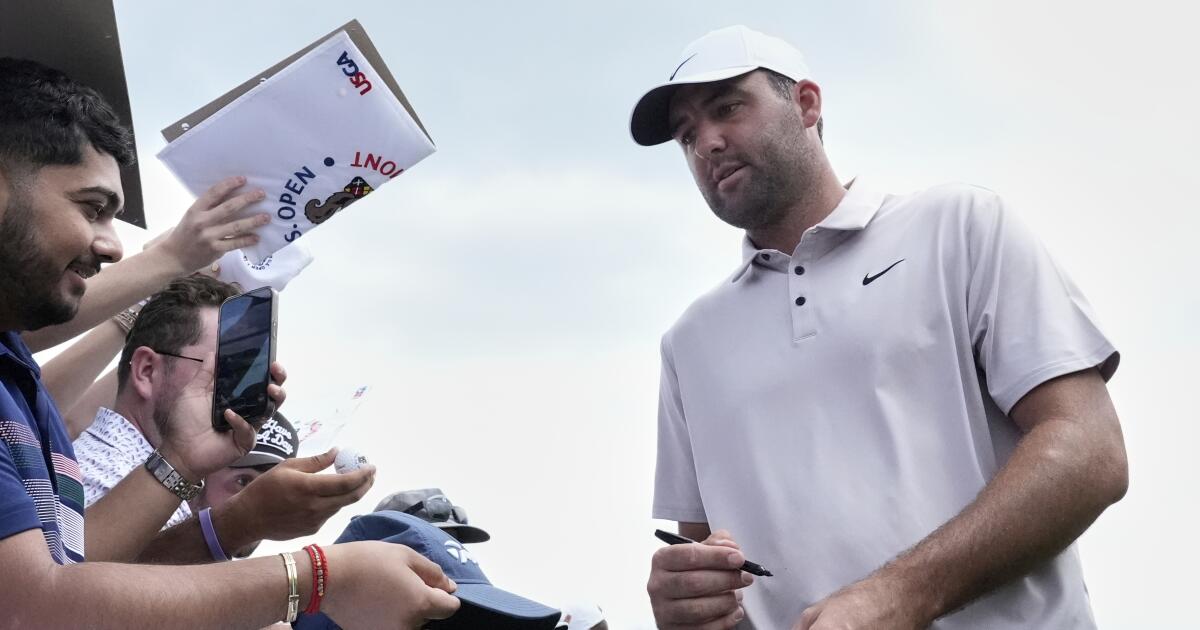That Scottie Scheffler is the prohibitive favorite to win the U.S. Open this week at historic Oakmont Country Club surprises no one. He’s the top-ranked golfer in the world, winning three of his last four starts, including the PGA Championship.
That Scheffler deleted his Venmo account because bettors continually clicked the pay/request link on the mobile payment app and rudely demanded that he reimburse them when he didn’t win probably shouldn’t surprise anyone, either.
“I think everybody hears from fans whether they have a financial benefit or anything in their outcome,” Scheffler told reporters at the U.S. Open on Tuesday. “That’s why I had to get rid of my Venmo, because I was either getting paid by people or people requesting me a bunch of money when I didn’t win. It wasn’t a good feeling.”
Scheffler chuckled nervously when he said it, but athletes getting harassed by folks who lost money betting on their performances isn’t a laughing matter.
Ever since the U.S. Supreme Court in 2018 struck down a federal law that had prohibited most states from allowing sports betting, abuse toward athletes from bettors who blame them for their financial losses has soared. Gambling on sports is now legal in 39 states.
Houston Astros pitcher Lance McCullers Jr. and Boston Red Sox pitcher Liam Hendriks said recently that their families have received death threats on social media.
A man who lost money May 10 when McCullers gave up seven runs while recording only one out in a loss to the Cincinnati Reds threatened to “murder” McCullers’ two young daughters. Police traced the threats to an intoxicated man overseas who had lost money betting on the game.
“I understand people are very passionate and people love the Astros and love sports, but threatening to find my kids and murder them is a little bit tough to deal with,” McCullers said in an understatement. “There have been many, many threats over the years aimed at me mostly … but I think bringing kids into the equation, threatening to find them or next time they see us in public they’re going to stab my kids to death. Things like that are tough to hear as a dad.”
Hendriks posted on his Instagram story that he has received death threats while struggling to regain his form after missing nearly two years because of Non-Hodgkin Lymphoma and Tommy John surgery.
“Threats against my life and my wife’s life are horrible and cruel,” Hendriks wrote. “You need help. Comments telling me to commit suicide and how you wish I died from cancer are disgusting and vile. Maybe you should take a step back and re-evaluate your life’s purpose before hiding behind a screen attacking players and their families.
Hendriks later explained to reporters why he responded on social media.
“With the rise of sports gambling, it’s gotten a lot worse,” he said. “Unfortunately, that tends to be what it ends up being — whether it be Venmo requests, whether it be people telling you in their comments, ‘Hey, you blew my parlay. Go [f—-] yourself,’ kind of stuff.”
Some gamblers believe they can impact the outcomes of competition through harassment. FanDuel banned a man in Philadelphia after he bragged on social media about intimidating three-time Olympic gold medalist Gabby Thomas at a Grand Slam Track meet two weeks ago.
“I made Gabby lose by heckling her. And it made my parlay win,” he wrote on a post that included a screenshot of two bets on FanDuel.
Thomas responded by posting, “This grown man followed me around the track as I took pictures and signed autographs for fans (mostly children) shouting personal insults — anybody who enables him online is gross.”
College athletes are also targets, especially during high-volume betting events such as March Madness and the College Football Playoff.
The NCAA is lobbying for states to ban proposition bets on the performances of individual college athletes, saying it creates a temptation to compromise game integrity.
College athletes have long been considered more susceptible to taking money from gamblers than pro athletes because they are amateurs. That will soon change because of the passage last week of the House settlement, a revenue-sharing model that will allow universities to directly pay athletes up to $20.5 million per year.
Not to say paying college athletes will insulate them from disgruntled gamblers. The NCAA will continue to press for laws that could ban bettors from state-licensed sportsbooks if they are found guilty of harassment.
The sheer volume of betting makes policing the harassment and intimidation of athletes an enormous challenge. This year, it was estimated that $3 billion was legally wagered on the men’s and women’s NCAA basketball tournaments, according to the American Gaming Association (AGA), an increase of about 10% from 2024.
In an attempt to be proactive about harassment ahead of March Madness, the NCAA posted a public service announcement video titled “Don’t Be a Loser.”
“There’s losing and then there’s being a loser. Game time comes with enough pressure,” the video said. “Way too often, people are betting on sports, losing, and taking it out on the athletes. Only a loser would harass college athletes after losing a bet, but it happens almost every day.
“Root for your team, get crazy when the buzzer sounds, but don’t harass anyone because you lost a bet. It’s time we draw the line and put an end to the abuse.”
Scheffler drew the line by deleting his Venmo account, which had become just another means for gamblers to communicate with a prominent athlete. His career earnings exceed $150 million, according to Spotrac, but he said a handful of bettors had paid him “maybe a couple bucks here or there” via Venmo after he won tournaments and presumably lined their pockets as well.
“That didn’t happen nearly as much as the requests did,” Scheffler added.
